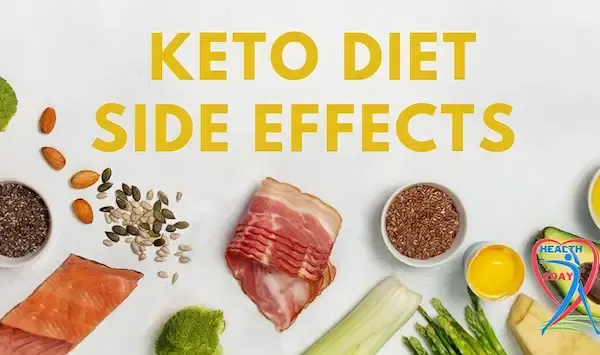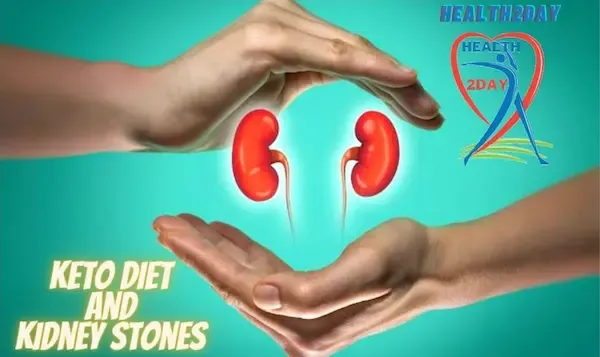The ketogenic diet is a low-carbohydrate, high-fat diet that is often employed for weight reduction.
Restricting carbohydrate consumption and increasing fat consumption may result in ketosis, a metabolic state in which the body depends largely on fat for energy rather than carbohydrates.
However, you should also be aware of the keto diet side effects associated with this diet.
seven keto diet side effects to be aware of
1• May result in keto flu
You may suffer flu-like symptoms when your body depletes its carbohydrate reserves and transitions to utilize ketones and fat for fuel during the beginning of this eating pattern.
As your body adapts to ketosis, you may experience headaches, dizziness, tiredness, nausea, and constipation owing in part to dehydration and electrolyte imbalances.
Although the majority of individuals who experience the keto flu get better after a few weeks, it is crucial to monitor these symptoms throughout the diet, keep hydrated, and consume meals high in salt, potassium, and other electrolytes.
In the beginning of the keto diet, you may suffer flu-like symptoms while your body learns to utilize ketones and fats as its major energy source.
2• May cause renal stress
A large consumption of animal foods may cause your blood and urine to become more acidic, resulting in an increase in calcium excretion via your urine.
Several studies indicate that the ketogenic diet lowers the quantity of citrate produced in the urine. Given that citrate may bind to calcium and prevent the production of kidney stones, its deficiency may increase your chance of getting these conditions.
In addition, those with chronic kidney disease (CKD) should avoid the ketogenic diet, since their kidneys may not be able to clear the acid accumulation in the blood that arises from eating animal products. This may cause acidosis, which can accelerate the course of CKD.
Moreover, persons with CKD are generally advised to consume diets low in protein, while the ketogenic diet is moderate to high in protein.
A large consumption of animal foods on the ketogenic diet may increase the acidity of urine and the risk of kidney stones. This acidic condition may also exacerbate chronic renal disease.
3• May result in digestive problems and alterations in gut bacteria
Since the ketogenic diet excludes carbohydrates, it might be challenging to achieve daily fiber requirements.
Some of the best sources of fiber, such as high-carb fruits, starchy vegetables, whole grains, and legumes, are excluded from the diet because of their high carbohydrate content.
Consequently, the ketogenic diet might cause intestinal pain and constipation.
65 percent of children with epilepsy on the ketogenic diet reported constipation as a typical side effect, according to a 10-year research.
Additionally, fiber feeds the healthy intestinal microorganisms. A healthy stomach may promote immunity, mental health, and inflammation.
A low-carb, low-fiber diet, such as keto, may have a deleterious effect on your gut microbes, however research on this issue is conflicting.
High-fiber keto-compliant foods include flax seeds, chia seeds, coconut, broccoli, cauliflower, and leafy greens.
Due to its carbohydrate limitation, the ketogenic diet is often low in fiber. This may result in constipation and harm to the digestive system.
4• Can result in nutritional deficits
Since the ketogenic diet prohibits a variety of foods, including nutrient-dense fruits, whole grains, and legumes, it may not supply enough levels of vitamins and minerals.
Some studies indicate that the ketogenic diet is deficient in calcium, vitamin D, magnesium, and phosphorus.
Research that assessed the nutritional profile of typical diets indicated that extremely low carbohydrate eating patterns like Atkins, which is comparable to keto, offered adequate levels of just 12 of the 27 vitamins and minerals your body requires.
This may result in vitamin deficits over time.
Notably, recommendations for doctors who treat individuals on a very low-calorie ketogenic diet for weight lose advocate supplementation with potassium, salt, magnesium, calcium, omega-3 fatty acids, psyllium fiber, and vitamins B, C, and E.
Remember that the nutritional sufficiency of this diet relies on the items you consume. A diet rich in healthful low-carb foods, such as avocados, almonds, and non-starchy vegetables, has more nutrients than a diet strong in processed meats and keto delights.
According to certain research, the ketogenic diet is deficient in vitamins and minerals, particularly potassium and magnesium. This might result in vitamin deficits over time.
5• May produce life-threateningly low blood sugar
Low-carb diets, such as keto, have been demonstrated to assist diabetics regulate their blood sugar levels.
Some studies show that the ketogenic diet may help reduce hemoglobin A1c levels, a marker of average blood sugar levels.
Hypoglycemia, which is characterized by disorientation, trembling, weariness, and sweating, is more likely to occur in patients with type 1 diabetes. Untreated hypoglycemia may result in coma and death.
In a study of 11 persons with type 1 diabetes who maintained a ketogenic diet for more than two years, the median number of low blood sugar episodes per day was close to one.
Individuals with type 1 diabetes frequently suffer low blood sugar if they take an excessive amount of insulin and do not consume sufficient carbohydrates. Thus, a keto diet low in carbohydrates may raise the risk.
Theoretically, patients with type 2 diabetes who use insulin medicines might also experience this.
Even while low-carbohydrate diets have been demonstrated to enhance blood sugar management in diabetics, they may also increase the chance of low blood sugar episodes, particularly in those with type 1 diabetes.
6• Could harm bone health
The ketogenic diet is also linked to poor bone health.
Numerous animal studies relate the ketogenic diet to lower bone strength, most likely owing to bone mineral density decreases that may occur when the body adjusts to ketosis.
In fact, 68 percent of 29 children with epilepsy on the keto diet had a decreased bone mineral density score six months after beginning the diet.
Another research with 30 top walkers found that individuals who followed a ketogenic diet for 3.5 weeks had considerably greater levels of blood indicators for bone disintegration than those who had a diet rich in carbohydrates. Nonetheless, further research is required.
Further research is necessary, although the ketogenic diet may cause a reduction in bone mineral density and bone loss over time.
7• May raise your chance of developing chronic conditions and dying prematurely
The impact of the ketogenic diet on the risk of chronic diseases, such as heart disease and cancer, is strongly contested and not fully understood.
Some data shows that high-fat, low-carbohydrate diets that highlight animal foods may be detrimental to health, while diets that concentrate vegetable sources of lipids and proteins are beneficial.
A long-term observational research including over 130,000 individuals found a correlation between animal-based low carbohydrate diets and increased risks of mortality from heart disease, cancer, and all causes.
Conversely, vegetable-based low-carbohydrate diets were related with a decreased mortality rate from heart disease and all causes.
Another research involving over 15,000 individuals revealed similar findings, however both low and high carb diets were associated with a higher all-cause mortality rate compared to moderate carb diets in which carbohydrates made up 50–55 percent of daily calories.
However, more considerable research is required. Despite contradictory findings, some data suggests
Summary:
The ketogenic diet is a low-carbohydrate, high-fat diet often employed for weight reduction. It may cause flu-like symptoms as your body learns to utilize ketones and fats for energy.
The keto diet side effects also include cause renal stress and increase the risk of developing kidney stones. Some studies indicate that the ketogenic diet is deficient in calcium, vitamin D, magnesium, and phosphorus. This may result in vitamin deficits over time. A diet rich in healthful low-carb foods, such as avocados, almonds, and non-starchy vegetables, has more nutrients. Low-carbohydrate diets have been demonstrated to enhance blood sugar management in diabetics.
They may also increase the chance of low blood sugar episodes, particularly in those with type 1 diabetes. The ketogenic diet is also linked to lower bone strength and decreased bone mineral density.
The impact of the ketogenic diet on the risk of chronic diseases, such as heart disease and cancer, is not fully understood. Some data shows that high-fat, low-carbohydrate diets that highlight animal foods may be detrimental to health, while diets that concentrate vegetable sources of lipids and proteins are beneficial.




